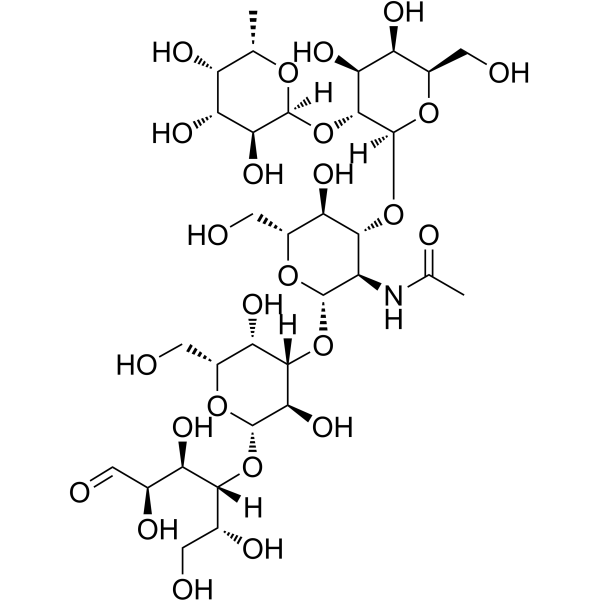| In Vitro |
Lacto-N-fucopentaose I (25-3200 μg/mL;48 h) exhibits certain cytotoxicity at 3200 μg/mL but no toxic reaction below 1600 μg/mL[1]. Lacto-N-fucopentaose I (25-1600 μg/mL; 14-18 h) can protect EV71-infected RD cells from death[1]. Lacto-N-fucopentaose I (100-400 μg/mL; 16 h) decreases markedly mRNA levels of VP1 and ROS production in EV71-infected RD cells at 400 μg/mL; leads to the recovery of EV71-induced S phase arrest in RD cells[1]. Lacto-N-fucopentaose I (100 and 200 μg/mL; 3 days) inhibits cell apoptosis in Caenorhabditis elegans; significantly decreases the levels of Egl-1, Ced-3 and Ced-4[1]. Lacto-N-fucopentaose I can reduce the abundance of Sphingobacterium, Stenotrophomonas and Achromobacter; can increase the abundance of Micromonospora, Vibrio, Acidibacter, Gaiella, Devosia, Steroidobacter, Variibacter, Dactylosporangium, RB41, Pir4_lineage, Pirellula, Haliangium, Roseiflexus, Pedomicrobium, and Bradyrhizobium. Cell Viability Assay[1] Cell Line: RD cells Concentration: 25, 50, 100, 200, 400, 800, 1600 and 3200 μg/mL Incubation Time: 48 h Result: Exhibited certain cytotoxicity at 3200 μg/mL but no toxic reaction below 1600 μg/mL. RT-PCR[1] Cell Line: RD cells (infected with EV71) Concentration: 100, 200 and 400 μg/mL Incubation Time: 16 h Result: Decreased markedly mRNA levels of VP1 only at 400 μg/mL. Apoptosis Analysis[1] Cell Line: RD cells (infected with EV71) Concentration: 100, 200 and 400 μg/mL Incubation Time: 16 h Result: Decreased the rate of cells in early apoptosis to 10.9% ± 1.26% at 400 μg/mL, while the untreated EV71 group was 27.7% ± 2.13%. Significantly inhibited the activity of caspase-3, caspase-8 and caspase-9. Recovered the decreased mRNA expression of PAPR, NF-κB and Bcl-2 and properly regulated Bad and Fas into their normal levels. Cell Cycle Analysis[1] Cell Line: RD cells (infected with EV71) Concentration: 100, 200 and 400 μg/mL Incubation Time: 12 h Result: Rescued EV71-induced S phase arrest, which promoted the transition of the G1 phase to the S phase.
|
